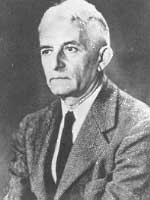 |
Wolfgang Köhler |
 |
Wolfgang Köhler |
German-American psychologist, one of the founders of Gestalt psychology with Kurt Koffka. Köhler gained fame with his studies on cognitive processing involved in animal problem-solving. Köhler argued that animals do not learn everything through a gradual trial-and-error process, or stimulus-response association. His tests in Tenerife in the 1910s with chimpanzees suggested that these animals solved problems by understanding - like human beings, they are capable of insight learning, the "aha!" solutions to problems. Köhler also discovered with von Restoff the isolation effect in memory, contributed to the theory of memory and recall, and developed nonassociationistic theory of the nature of associations.
Köhler's most intelligent chimpanzee was Sultan. In the simplest case the desired object was placed on the other side of a fence at the end of an alley. The ape, according to Köhler, conceptualized the Gestalt by turning back down the alley and going around to the other side of the fence. In one famous test there were two bamboo sticks in a chimpanzee's cage, but neither of them was long enough to reach a banana outside the cage. After many attempts the chimpanzee pushed the thinner of the two sticks into the hollow inside the thicker one and then drew the banana toward himself. The animals also learned to use boxes as "climb-upon-tables" to reach desirable lures. However, Köhler's tests were not very well controlled. Often several chimpanzees were in the cage at the same time. His critics found a number of alternative explanations, and stated that animals might have learned from imitating one another.
Gestalt psychology is one of the six main schools of psychology with structuralism, functionalism, associationism, behaviorism and psychoanalysis (Freud, Jung, Adler). The key argument is that the nature of the parts is determined by the whole - parts are secondary to the whole. In perception we, and the animals, are aware directly of a configuration on a structure which is grasped as a whole. That is why, as an example, we hear in music a melody instead of separate notes. Köhler underlined that one must examine the whole to discover what its natural parts are, and not proceed from supposed elements into large entities.